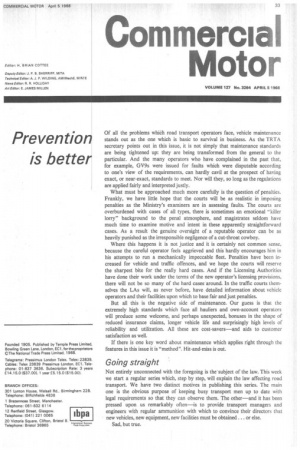Prevention is better
Page 35

If you've noticed an error in this article please click here to report it so we can fix it.
Of all the problems whiCh road transport operators face, vehicle maintenance stands out as the one which is basic to survival in business. As the TRTA secretary points out in this issue, it is not simply that maintenance standards are being tightened up: they are being transformed from the general to the particular. And the many operators who have complained in the past that, for example, GV9s were issued for faults which were disputable according to one's view of the requirements, can hardly cavil at the prospect of having exact, or near-exact, standards to meet. Nor will they, so long as the regulations are applied fairly and interpreted justly.
What must be approached much more carefully is the question of penalties.
Frankly, we have little hope that the courts will be as realistic in imposing penalties as the Ministry's examiners are in assessing faults. The courts are overburdened with cases of all types, there is sometimes an emotional "killer lorry" background to the penal atmosphere, and magistrates seldom have much time to examine motive and intent in these apparently straightforward cases. As a result the genuine oversight of a reputable operator can be as heavily punished as the irresponsible negligence of a cut-throat cowboy.
Where this happens it is not justice and it is certainly not common sense, because the careful operator feels aggrieved and this hardly encourages him in his attempts to run a mechanically impeccable fleet. Penalties have been in creased for vehicle and traffic offences, and we hope the courts will reserve the sharpest bite for the really hard cases. And if the Licensing Authorities have done their work under the terms of the new operator's licensing provisions, there will not be so many of the hard casesaround. In the traffic courts themselves the LAs will, as never before, have detailed information about vehicle operators and their facilities upon which to base fair and just penalties.
But all this is the negative side of maintenance. Our guess is that the extremely high standards which face all hauliers and own-account operators will produce some welcome, and perhaps unexpected, bonuses in the shape of reduced insurance claims, longer vehicle life and surprisingly high levels of reliability and utilization. All these are cost-savers—and aids to customer satisfaction as well.
If there is one key word about maintenance which applies right through the features in this issue it is "method". Hit-and-miss is out.
Going straight
Not entirely unconnected with the foregoing is the subject of the law. This week we start a regular series which, step by step, will explain the law affecting road transport. We have two distinct motives in publishing this series. The main one is the obvious purpose of keeping busy transport men up to date with legal requirements so that they can observe them. The other—and it has been pressed upon us remarkably often—is to provide transport managers and engineers with regular ammunition with which to convince their directors that new vehicles, new equipment, new facilities must be obtained. . . or else.
Sad, but true.




























































































































































